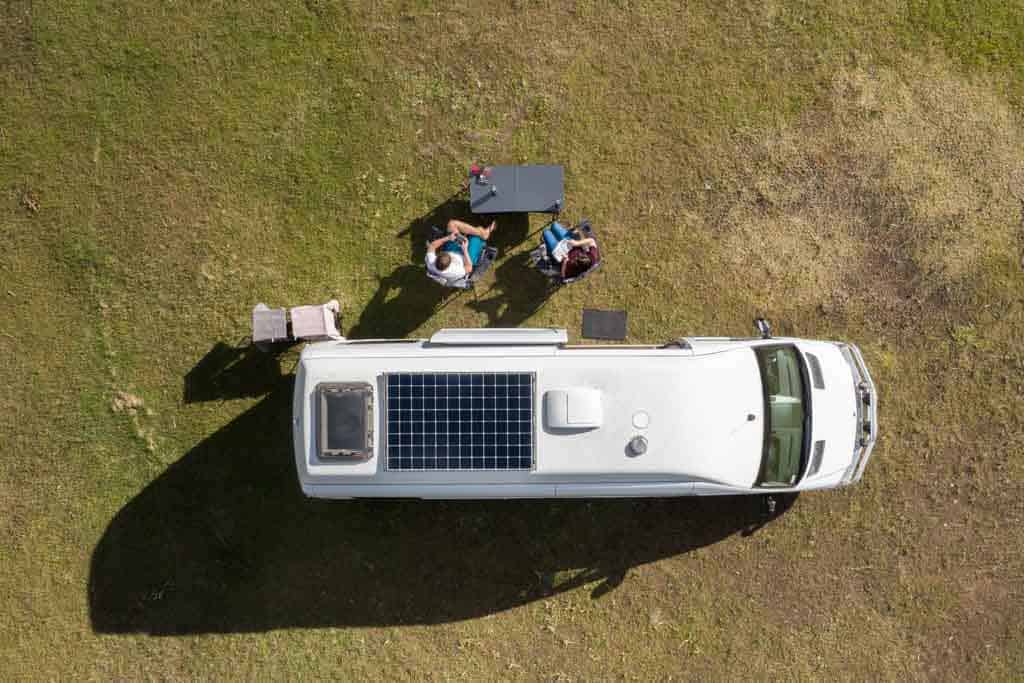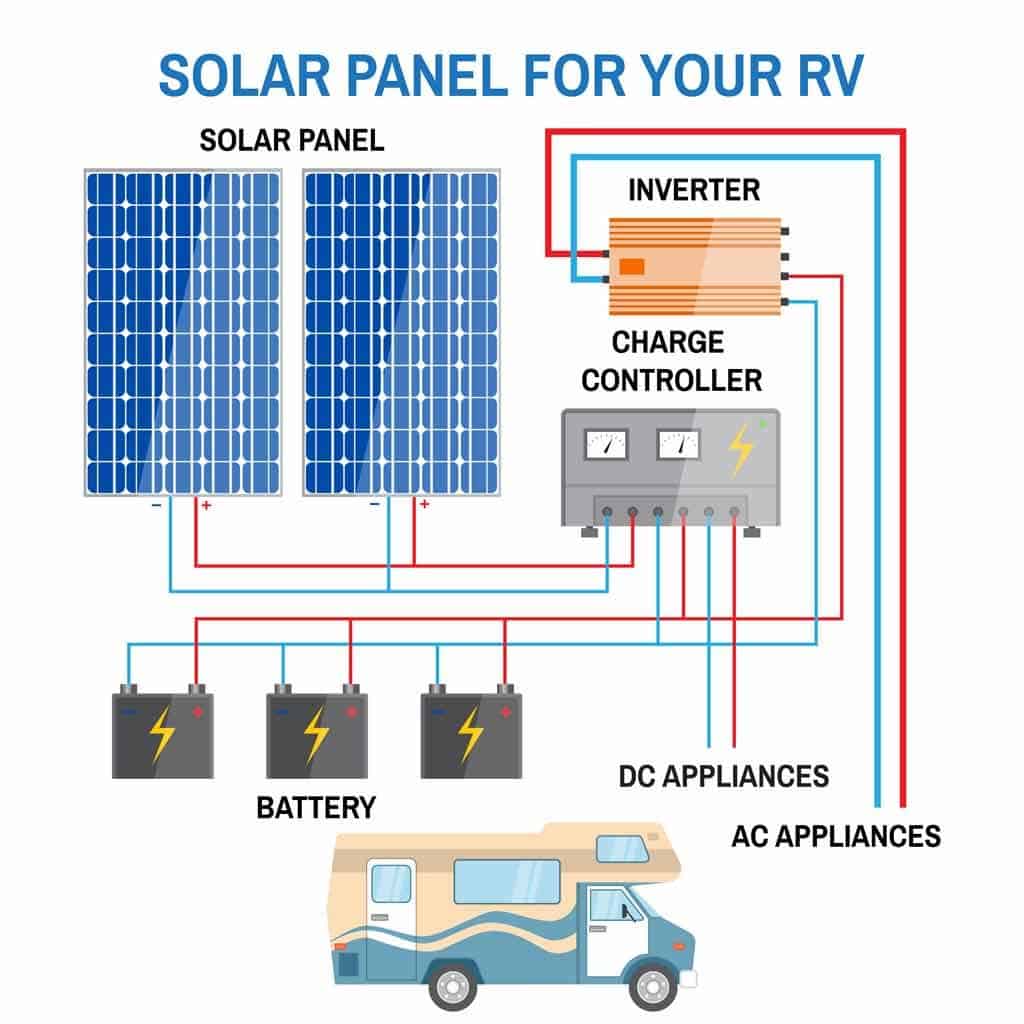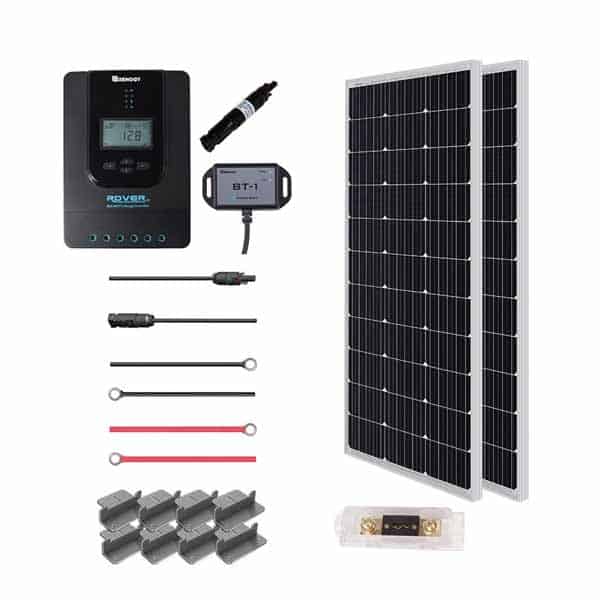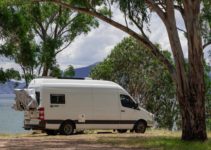Having the best campervan solar panels will add to your power needs while removing your worry. Find out which van life solar panels we recommend.
Solar panels are a valuable investment for any camper van or RV owner. Maybe you’re about to embark on an epic road trip, or maybe you’re interested in boondocking your way across the country.
Perhaps you’re just looking for a way to make your RV more environmentally friendly.
Having campervan solar panels has many benefits, especially if you’re planning on spending a lot of time on the road or camping off the grid.
Along with other accessories, like the ones we have listed in this comprehensive blog post, a solar kit will allow you to recharge your battery bank when you’re not connected to shore power, so you can still watch TV or charge your computer or cell phone.
Not to mention, a high-quality solar panel for camper vans a low-maintenance way to generate and conserve clean energy while saving you money in the long run.
But with so many different brands, styles, and types of panels on the market, choosing the right camper solar panels for an RV can be difficult.
EDITOR’S CHOICE:
Renogy 200W Solar Kit
We’re just going to come out and say it now – the Renogy 200w Solar Power Premium Kit is by far the best bang-for-your buck product you can get if you want high quality and affordability.
Besides having a massive 98% efficiency rating and up to 25-year warranty, the kit also comes with everything you need to get set up for off-grid living.
Because we love this kit so much we managed to get an exclusive 10% off discount for VLT readers too! Just use the code ‘vanlifetheory‘ at checkout on the Renogy site.

We’ve done the heavy lifting to tell you what to look for in a solar system and to help you decide which solar panels for campers are best for your needs.
CAMPERVAN SOLAR PANELS | WHAT WE LIKE | THINGS TO CONSIDER | |
RENOGY 200W SOLAR PANEL KIT Our #1 Rated |
|
| |
WINDYNATION 100W POLYCRYSTALLINE KIT |
|
| |
RENOGY 100W 12V MONOCRYSTALLINE FOLDABLE PORTABLE SOLAR SUITCASE |
|
| |
ACOPOWER 120W PORTABLE FOLDABLE SUITCASE |
|
| |
ALLPOWERS 100W FLEXIBLE SOLAR CHARGER |
|
| |
DDY BENDABLE SOLAR PANEL |
|
| |
RENOGY 100W FLEXIBLE SOLAR PANEL |
|
| |
SUNPOWER 170W FLEXIBLE HIGH-EFFICIENCY SOLAR PANEL |
|
| |
HQST 100 WATT POLYCRYSTALLINE SOLAR PANEL KIT |
|
| |
NRGGO 100W MONOCRYSTALLINE SOLAR PANEL |
|
|
The Best Solar Panels for RVs
We looked at a few key features to determine the best solar panels; this includes energy efficiency, size, weight, ease of installation, and of course, price.
Based on this research, we’ve compiled this list of the best solar panels for van and RV owners.
Renogy 200w Solar Panel Premium Kit – The Best Campervan Solar Panel on the Market
The Renogy 200w Solar Panel Premium Kit is by far the best option on the market for van lifers who want to maximize the performance of their camper van solar system, go off-grid and don’t want to kill the budget either (especially when you combine it with our exclusive 10% discount code we worked hard to get below).
This kit comes with everything you need to hook up your van and battery to solar, including 2x 100w panels, a specialised charge controller giving 98% peak conversion efficiency and Z mounts, plus it even connects to Bluetooth so you can monitor your power input on your phone in real time. Trust us, it’s a feature we always use!
These rigid panels can be used on the ground or van-mounted, and combined with multiple units for extra power. While it’s suitable to charge 12V batteries, it can also be outfitted to charge 24V or 48V batteries as well.
In addition, it’s one of the quietest and more durable solar panel for camper vans out there. In the rare event that something does break, the Renogy panel comes with a 5-year warranty on material damage and a 25-year warranty on solar output.
SPECIAL RENOGY DISCOUNT DEAL: CLICK our link below FOR YOUR PURCHASE and Don’t forget to use “VanLifeTheory” at checkout for 10% off all Renogy Products, AN EXCLUSIVE DEAL WE’VE NEGOTIATED JUST FOR VAN LIFE THEORY READERS!
PROS
- Huge 98% power efficiency
- Lightweight
- Included control charger and mounting brackets
- Extremely durable
CONS
- Not the cheapest option on the market
WindyNation 100W Polycrystalline Kit
The WindyNation 100W Polycrystalline Kit is an affordable, straight out of the box option. It comes with everything you need for set up, including cables, mounting brackets, connectors, and an LCD screen display charge controller.
The ability to adjust different settings on the LCD screen is one of the kit’s biggest selling points because it displays detailed information (temperature, voltage, system’s amp-hours) while allowing you to adjust the level of power.
PROS
- Affordable
- Easy to use charge controller
- Durable, weather-resistant materials
CONS
- Below average 350-watt hours per day
Renogy 100W 12V Monocrystalline Foldable Portable Solar Suitcase
As one of the most well-known companies on the market, Renogy has some of the best solar panels for RVs and vans – that includes their 100 watt Portable Solar Suitcase.
Although it packs up small (19.9 x 27.2 x 2.8 inches), you can expect it to be made with the long-lasting and durable materials that Renogy is known for.
It’s super easy to set up, and the LCD display screen makes it easy to understand the operating information, which is great for first-time buyers.
PROS
- Compact and portable
- Easy to read LCD charge controller
- Overcharge protection
- Durable
CONS
- Expensive price point
ACOPOWER 120W Portable Foldable Suitcase
This foldable panel system packs a huge punch in just a light 8.4-pound kit. With a total of 120W, it’s more powerful than other portable panels of its size, while still portable enough to bring with you around the campground.
Best of all, it comes with everything you need (charger cable, suitcase with handle, built-in bypass) and can be set up in as little as a minute.
PROS
- Comes with a durable suitcase
- Can be used practically anywhere
- Easy to set up and use
CONS
- Not waterproof
- Hard to close with all cords
ALLPowers 100w Flexible Solar Charger
The ALLPowers Solar Panel is one of the best flexible panels on the market today. Its low-profile design is bendable up to 30-degrees and only weighs a minimal 4.7 pounds.
What’s most notable about this flexible charger is that it’s extremely energy efficient. While most other monocrystalline panels get around 19-20% energy, the ALLPowers cells can offer up to 23.5%.
But if you want more juice from it, you can always connect it with additional panels using an MPPT 30A controller.
PROS
- Lightweight at 4.7 pounds
- Pre-drilled holes for mounting
- 23.5% efficiency
CONS
- Rain resistant, but not waterproof
DDY Bendable Solar Panel
The practical, 40W DDY Bendable Solar Panel is a great addition to your solar panel toolkit. It provides just the right amount of power to charge your smaller electronics while camping without taking up too much space in your van.
While it can be connected with chords, this flexible panel can also be hung with suction cups for a quick on-the-go power session.
It still charges in cloudy weather, but it’s better to keep it out of the sun because the plastic backing can melt if it gets too hot.
PROS
- Lightweight
- Can be mounted with chords or suction cups
- Great for small charges
CONS
- Melts if it gets too hot
Renogy 100w Flexible Solar Panel
Clocking in at just 4 pounds, the ultra-lightweight Renogy flexible panel is a must-have for any van lifer. It can bend up to 248 degrees, which means you’ll have no problem mounting it to the curved roof of your campervan or airstream trailer.
With 18.4% efficiency, it’s not the most energy-efficient panel on this list. However, its high-quality construction and ability to conform to most surfaces are its unique selling points.
PROS
- Waterproof
- Most flexible solar panel on the market
CONS
- Prone to scratches
- Not as energy-efficient
SunPower 170W Flexible High-Efficiency SOlar Panel
When it comes to high-efficiency solar panels, look no further than the SunPower 170W Flexible High Efficiency Solar Panel. Each panel produces 31% more power than previous models – great if you’re short on van or rooftop space.
It’s also the only panel built on a copper foundation, which provides protection and support against cracking and high temperatures.
Although it’s not the cheapest panel on the market, it’s certainly one of the best van solar panels.
PROS
- Very high energy efficiency
- Durable and waterproof
CONS
- Expensive
- Shorter than average warranty
HQST 100 Watt Polycrystalline Solar Panel Kit
If you’re a first-time solar panel for RV buyer, then the HQST Solar Panel Kit is a great option. It’s relatively small (35.6 x 25.9 x 1.2 inches) and comes with mounting hardware, pre-drilled holes, and easy to follow instructions.
In sunny conditions, it can produce up to 500Wh per day – great if you’re purchasing a solar kit to power minor applications.
PROS
- Small, compact, and quiet
- Comes with all necessary hardware
CONS
- For more detailed setups, more hardware will be needed
nrgGO 100w Monocrystalline Solar Panel
The sleek, all-black nrgGO Solar Panel is just as efficient as it is elegant. Compared to polycrystalline panels of its size, the monocrystalline cells can produce up to 33% more energy, which you can use for a variety of ways while travelling in your van.
However, the solar panel works best in ideal sunny conditions. If the weather is cloudy or rainy, this could have a large impact on the panel’s charging efficiency.
PROS
- Attractive, all-black design
- Easy to install
CONS
- Weather can impact efficiency

Choosing the Best Campervan Solar Panels
Let’s dive deeper into what actually makes a good van-life solar panel.
WatTAGE OUTPUT
When researching solar panels, you’ll see that most panels come in either 50W, 100W, or 200W power. The number of watts you need depends on what you’re using the solar panels for. This daily power consumption is referred to as watt-hours (Wh).
On average, a 100W panel will supply around 400Wh of power per day. And you can increase the power generation by increasing the number of panels.
To put this into perspective, powering a 60W lightbulb for six hours uses 360Wh while watching a 200W TV for four hours uses 800Wh.
If you calculate that you’ll need more power for your trip, you might consider purchasing multiple solar panels for RV electricity.
So before you start adding panels to your roof, you should first think through the size of your battery bank and also evaluate how many watts of power you use on any given day.
If anything, it is better to invest in a larger and better house battery bank before adding more solar panels. But the perfect combination of battery capacity and solar panel size will keep your batteries topped off regardless of how much power you use throughout the day.
We’d recommend that the average van lifer not leave home with less than 200W of solar panels. But it’s more likely, and cost-effective, to consider a 400W system tied into 200-300Ah of AGM or lithium battery bank.
Of course, the amount of energy you get from your camper solar panel depends on the weather conditions. Don’t expect to get a full charge in indirect sunlight or on a cloudy day.
Wattage amount is an essential consideration because you have limited space on the camper van roof and inside the van. So, you have to critically think about your power consumption and power needs.
Weight and Size
The difference in weight between solar panels can be drastic. Some flexible panels weigh as little as four pounds, while large solar panel kits can be as heavy as 40 pounds.
If you’re planning on mounting a fixed panel to the top of your RV, you’ll need to make sure the roof can support the added weight.
When looking at flexible or portable panels, you should also consider the dimensions to make sure the panels can be easily stored inside your van.
READ MORE: Use your solar panels to keep your 12 volt TVs running!

Fixed vs. Portable Panels
Fixed solar panels are permanently mounted to the roof or side of your van or RV. They are constantly exposed to the light, which means they collect energy even while you’re driving on the road. If you have a large RV or campervan with plenty of roof space, then fixed panels are a worthwhile investment.
On the other hand, portable solar panels are sold as individual units or solar suitcases. They have to be set up at your campsite and manually positioned towards the sun. For many campervans where exterior space is limited, portable solar panels are the best option.
They have adjustable stands so that you can always keep the panels pointing to the sun. And you can usually purchase cable extensions that allow you to park your van in the shade and still capture solar energy 15-20 feet away.
The size of your camper van, the amount of power you need, and your budget are all factors to consider when choosing between fixed or portable panels.
Critical considering factors before selecting between these types are budget, space and power requirements.
Monocrystalline vs. Polycrystalline
When choosing solar panels for a campervan, you’ll also need to consider the type of solar gathering cell that’s used.
Panels that use monocrystalline cells are from a single source of silicon, making them more efficient compared to panels that use polycrystalline solar cells. Monocrystalline panels are smaller and more compact, although they also tend to be more expensive.
Monocrystalline panels are premium and slightly expensive solar products with a sleek appearance and superior performance.
They are called monocrystalline because single crystal silicon cells are used to make these panels. Due to their single-crystal construction, monocrystalline panels have more room for electrons to generate a flow of electricity. That’s why they are more efficient than polycrystalline.
We only recommend monocrystalline solar panels due to this efficiency.
Polycrystalline panels have blended silicon sources and are generally cheaper and bigger per watt. Polycrystalline cells are less efficient than monocrystalline cells, which means you’ll need more panels to get the same power.
Polycrystalline panels are less efficient than monocrystalline. These panels tend to be cheaper and produce a blue hue in the panels, unlike the black of monocrystalline panels.
In polycrystalline solar cells, multiple silicon fragments are melted in a single wafer. This process leaves less room for the electrons to move and thus reduces their efficiency.
Long story short, we’d recommend that you only invest in monocrystalline solar panels. Investing in polycrystalline at this point in time is wasting your money.
This post is a great resource if you’d like to learn more about the difference between Monocrystalline and Polycrystalline panels.
Rigid vs. Flexible Panels
RV solar panels come in both rigid and flexible materials.
Rigid panels are the most typical solar panels used for vans, houses, and even solar farms. When it comes to the solar panel setup for a campervan, most rigid panels are bolted or mounted directly onto the roof.
Because they are mounted under temperate glass and protected by an aluminium frame, the panels are incredibly durable and are made to withstand even the harshest of outdoor elements. Price-wise, rigid panels also tend to be cheaper per watt when compared to flexible panels.
The low profile look of flexible panels makes them a great option for stealthy campers. Most of these solar panels for campers weigh less than six pounds and are less than an inch thick, which allows them to bend around certain surfaces.
And because they don’t need to be mounted or drilled, flexible panels are easy to set up and use immediately.
READ MORE: Still deciding on the best type of battery for your RV or van? Check out our blog post on AGM vs lithium battery technology to help you choose.
Cost
The cost of solar panels is a crucial factor. You can literally spend as much or as little as you want on solar panels because there are so many on the market.
Cost is not a great factor for determining the quality of a panel. And expect decent quality panels to cost around $1-$1.50 per watt.
However, regardless of your budget consider solar panels a crucial investment in your campervan electrical system. It is better to purchase fewer higher-quality panels that you can later add to than to invest in inferior and outdated technology, as found in polycrystalline panels.
Additional Features
When buying solar panels, it’s important to look at any additional features or products included with the initial solar panel product, such as RV solar generators or other items.
For example, portable solar panels need charge controllers, connecting cords, and clips. Sometimes these are included in the panel kit, while other manufacturers require you to purchase them separately.
If you’re mounting a fixed panel, you’ll need a charge controller and mounting hardware. Again, it’s important to check the details to see if these are included with your purchase.
Rigid panels can also be attached to a tilting mount, which can increase your solar capacity by 25% by allowing them to directly face the sun. To maximize the efficiency of the panel, it’s worth looking for a model that includes the tilt mount with the panel.
Many additional features can add to the efficiency and convenience of solar panels. Some panels are sold individually, but there are solar kits as well. Solar panel kits have all the necessary accessories like controllers, mounting kits, wires clips and in short, everything you need to operate and mount solar panels.
There are several types of brackets and mounts. Tilt mounts are great for a campervan as they can increase solar generation by 25% as you are able to tilt the panels to capture sunlight when the sun is low in the sky in the morning and evening.
And then you may also find kits that include other power components such as inverters and batteries. Most manufacturers don’t include them in the package, but a few of them have.
If you want to shop for these separately, be sure to check out this post for the best campervan batteries and this post for the best inverters.
Wrapping Up
That is it with our guide and favorite solar panel recommendations. Now you have the knowledge to make an educated purchase decision. But you also have an idea of how diverse the market is.
In 2022, there are now dozens of brands and products that we didn’t begin to mention simply because they have not been tested with time. And solar panels are available in a number of different configurations, types, styles and much more.
So, if you don’t want to spend a couple of days in search of the best solar panel, then stick with our top recommended panels.
The Renogy 200W Solar Kit can generate 800Wh to 1,000Wh of electricity per day and has bypass diodes to enhance the low light performance.
Renogy has added every protective layer to keep it safe in the harshest environments. Moreover, it is quite versatile and compatible with almost all the available mounts and brackets.
EDITOR’S CHOICE:
Renogy 200W Solar Kit
We’re just going to come out and say it now – the Renogy 200w Solar Power Premium Kit is by far the best bang-for-your buck product you can get if you want high quality and affordability.
Besides having a massive 98% efficiency rating and up to 25-year warranty, the kit also comes with everything you need to get set up for off-grid living.
Because we love this kit so much we managed to get an exclusive 10% off discount for VLT readers too! Just use the code ‘vanlifetheory‘ at checkout on the Renogy site.
This post may contain affiliate links. That means if you make a purchase a product we recommend using the links in this article, we may receive a small commission at no extra cost to you. We promise to use this pocket money to buy lots of coffee and fuel for the campervan to keep us enjoying #VanLife for just a little longer. We appreciate your support, and only recommend products we know and trust. Thank you friends!











![The 4 BEST RV Wood Stoves – Ultimate Buyers Guide [2024]](https://vanlifetheory.com/wp-content/uploads/2021/10/RV-Wood-Stove-Feature-211x150.jpg)
![19 BEST Campervan Accessories [2023 Van Life Essentials]](https://vanlifetheory.com/wp-content/uploads/2020/08/Fairy-Lights-211x150.jpg)

SUNPOWER is excellent Solar panel. Bought 2 and connected in parallel. Keeps my Aliner battery charged! Cheers!
Awesome. So glad you had a great experience with Sunpower. Good to know, thank you. Happy travels.
I am very happy with this Renogy 100W Extremely Flexible Monocrystalline Solar Panel. I use it to charge my Webetop 155Wh 42000mAh Portable Generator Power Inverter Battery 100W. I love it because it has unbeatable flexibility, capable of producing a 248-degree arc. It is exceptionally lightweight at about four pounds, which helps me easily carry it around and install it by myself. It is also 95% thinner than traditional solar panels, giving it a stealthy appearance on my RV. While it is lightweight, it can resist 5400 Pa of snow and 2400 Pa of strong winds. Its junction box is also IP68-rated. It makes me feel more comfortable about the product’s safety and performance.
I wanna recommend this to anyone who wants a stealthy, super-flexible, and solar-efficient panel for different applications. No other flexible solar panel can beat this system.
Another thing I love about this HQST solar panel is that the accessories that come with the kit are excellent. The junction box is built with IP65 technology, making it waterproof. The cable connectors are about 2 feet long. This makes my solar system more mobile and gives me more flexibility as to how I want to set everything up.
Interesting article
We’ve been living full-time RVs for just over a year now, traveling North America and seeing all the amazing wilderness we can get in our 5th gear RV. Until a month ago, we relied mainly on 3400-watt generators to charge the batteries and turn on the lights. I was considering buying one of Renogy’s portable solar panels. At this point, I really wish we’d buy one of these first. It manages everything I need to maximize solar energy collection and storage. It charges the battery in four stages, optimizing the battery’s energy storage potential. It automatically detects flooded lithium, SLA, and gel batteries.
I used this panel a touch differently than most. I used it in conjunction with a controller and a bunch 24 deep cycle battery to drive 2 x 12v fans for my wife’s farm building. Everything except the battery was purchased through Amazon. Overall the system works as I expected. The panel puts out about 55.2 amps in direct sunlight, the fans together draw about 2.08 amps, so I have about 2 amps of panel output left to charge the battery. Controller voltage reads approximately 12913.0 volts with a totally charged battery and fans humming. The chickens seem to love them staying under the vents instead of starting off.
Thanks so much for sharing! I really like your post as well as its content. It is useful for me to make a decision to buy a new one for my RV. I have no reasons to stop following your other article.